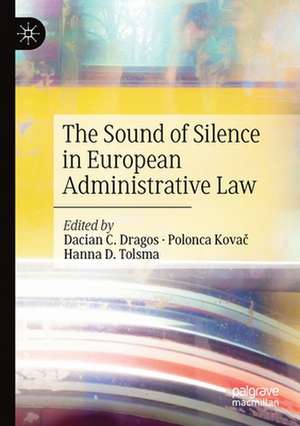The Sound of Silence in European Administrative Law
Editat de Dacian C. Dragos, Polonca Kovač, Hanna D. Tolsmaen Limba Engleză Paperback – 30 iul 2021
This book examines administrative silence in a comparative manner in the EU law and 13 jurisdictions from Europe. Administrative silence is an issue that lies at the intersection of legal and managerial aspects of public administration, a concept that is both reflecting and testing the principles of legal certainty, legality, good administration, legitimate expectations, and effectiveness. Inactivity or excessive length of proceedings appears to be of interest for comparisons, particularly in the context of the recent attempts to develop European convergence models. The book offers in-depth insights into legal regulation, theory, case law and practice regarding positive and negative legal fictions in the selected European jurisdictions.
| Toate formatele și edițiile | Preț | Express |
|---|---|---|
| Paperback (1) | 1008.28 lei 43-57 zile | |
| Springer International Publishing – 30 iul 2021 | 1008.28 lei 43-57 zile | |
| Hardback (1) | 1011.45 lei 43-57 zile | |
| Springer International Publishing – 29 iul 2020 | 1011.45 lei 43-57 zile |
Preț: 1008.28 lei
Preț vechi: 1229.61 lei
-18% Nou
Puncte Express: 1512
Preț estimativ în valută:
192.94€ • 201.95$ • 160.58£
192.94€ • 201.95$ • 160.58£
Carte tipărită la comandă
Livrare economică 31 martie-14 aprilie
Preluare comenzi: 021 569.72.76
Specificații
ISBN-13: 9783030452292
ISBN-10: 3030452298
Pagini: 497
Ilustrații: XXVIII, 497 p. 14 illus., 6 illus. in color.
Dimensiuni: 148 x 210 mm
Greutate: 0.69 kg
Ediția:1st ed. 2020
Editura: Springer International Publishing
Colecția Palgrave Macmillan
Locul publicării:Cham, Switzerland
ISBN-10: 3030452298
Pagini: 497
Ilustrații: XXVIII, 497 p. 14 illus., 6 illus. in color.
Dimensiuni: 148 x 210 mm
Greutate: 0.69 kg
Ediția:1st ed. 2020
Editura: Springer International Publishing
Colecția Palgrave Macmillan
Locul publicării:Cham, Switzerland
Cuprins
1. In Search of an Effective Model: A Comparative Outlook on Administrative Silence in Europe.- 2. Silence of the EU authorities: the legal. consequences of inaction by the EU administration.- 3. Administrative Silence in Germany.- 4. Silence in the French administrative system: a failed revolution?.- 5. Legal Instruments to Confront Administrative Inaction: a Gift for the Citizen but a Curse for the Government?.- 6. Remedies against Administrative Silence in the Netherlands.- 7. Administrative Silence in Italy, Between (Desired) Simplification and (Practical) Complication.- 8. The Sound of Silence in Spain.- 9. Administrative Silence in Portugal.- 10. Legal and Administrative Challenges of Administrative Silence in Slovenia.- 11. Administrative Silence in Croatia: Between Fiction and Reality.- 12. The Privilege of Silence in Serbian Administrative Law.- 13. Using Legal Fictions to Deal with Administrative Silence. The Case of Romania.- 14. Administrative Silence: A Polish Perspective.- 15. Administrative Silence in Lithuania: Case Law and Data from the Administrative Oversight Institutions.
Notă biografică
Dacian C. Dragos is Jean Monnet Professor of Administrative and European Law and Co-director of the Center for Good Governance Studies at the Babes Bolyai University, Romania. Since 2010 he has chaired the Law and Administration panel of the European Group of Public Administration (EGPA). His research publications include several edited books, over 40 chapters in international books, and over 50 papers in scientific journals.
Polonca Kovač, Professor at the Faculty for Public Administration, University of Ljubljana, Slovenia. She is a steering committee member of the Network of Institutes and Schools of Public Administration in Central and Eastern Europe (NISPAcee) and a co-director of the Law and Administration panel of the EGPA. She is an editor and author of numerous articles and books, editor-in-chief of the Central European Public Administration Review, and an OECD/SIGMA expert.
Hanna D. Tolsma is Assistant Professor at the Department of Constitutional Law, Administrative Law and Public Administration of the University of Groningen, the Netherlands. Her publication mainly relates to administrative law and environmental law. She is a member of the editorial board of AB Rechtspraak Bestuursrecht and honorary judge at the District Court in the North of the Netherlands.
Textul de pe ultima copertă
This book examines administrative silence in a comparative manner in the EU law and 13 jurisdictions from Europe. Administrative silence is an issue that lies at the intersection of legal and managerial aspects of public administration, a concept that is both reflecting and testing the principles of legal certainty, legality, good administration, legitimate expectations, and effectiveness. Inactivity or excessive length of proceedings appears to be of interest for comparisons, particularly in the context of the recent attempts to develop European convergence models. The book offers in-depth insights into legal regulation, theory, case law and practice regarding positive and negative legal fictions in the selected European jurisdictions.
Dacian C. Dragos is Jean Monnet Professor of Administrative and European Law and Co-director of the Center for Good Governance Studies at the Babes Bolyai University, Romania.
Polonca Kovač is Professor of Administrative Law and Public Administration at the University of Ljubljana, Slovenia.
Hanna D. Tolsma is Assistant Professor at the Department of Constitutional Law, Administrative Law and Public Administration of the University of Groningen, the Netherlands.
Caracteristici
The first book on administrative silence, tackling both the legal aspects and empirical evidence of how the legal institution works in practice Develops a comparative perspective on the different legal options for dealing with administrative silence in selected European jurisdictions Argues that a recent trend towards assigning administrative silence positive legal effects in administrative decision-making is controversial and it encounters resistant in practice Aims to be a source of inspiration for legislators when considering modes of dealing with administrative timeliness and for practitioners and courts when interpreting and applying legislation already in place
